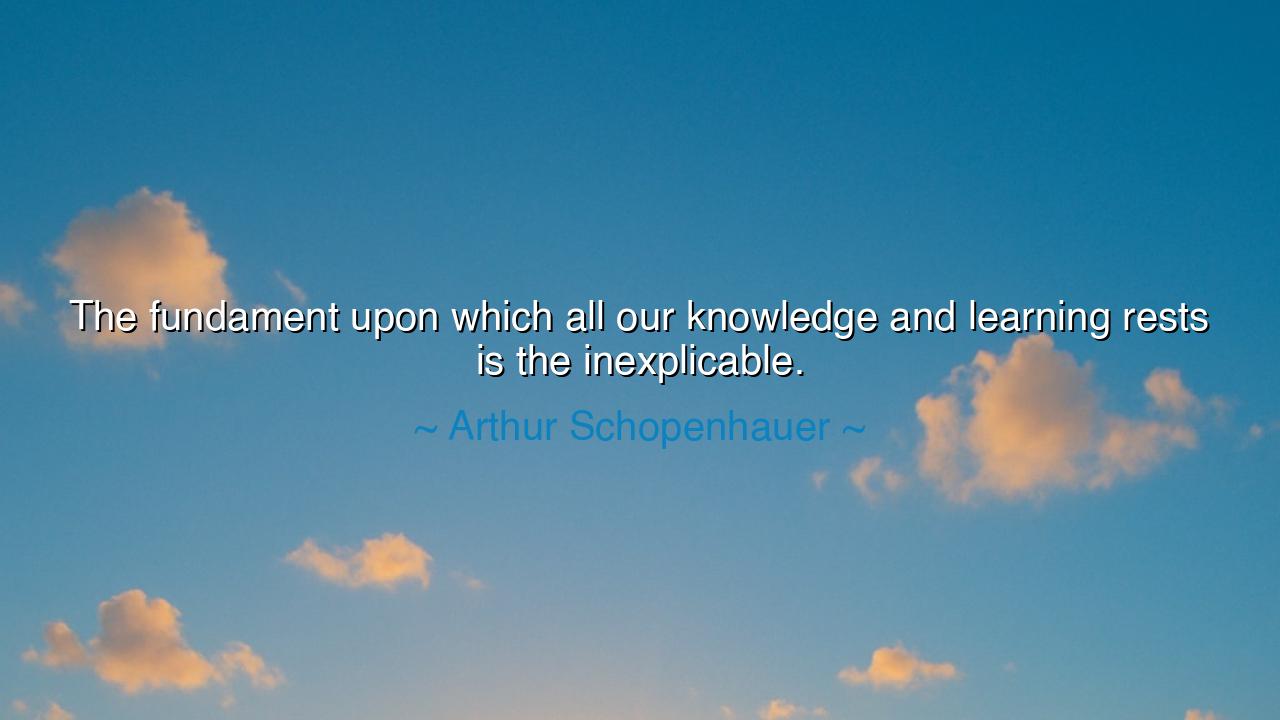
The fundament upon which all our knowledge and learning rests is






Hear the voice of Arthur Schopenhauer, philosopher of shadows and light, who proclaimed: “The fundament upon which all our knowledge and learning rests is the inexplicable.” In this solemn reflection lies a paradox that both humbles and elevates the human spirit. For all our striving to measure, define, and categorize the world, there remains beneath it an abyss that cannot be explained. The inexplicable is not an enemy of knowledge—it is its very foundation. It is the silent ground from which every question rises and to which every answer must eventually return.
What is this inexplicable? It is the mystery of existence itself. Why there is something rather than nothing. Why life breathes in us, why time flows, why the universe abides in law and pattern. We can describe how things work; we can build theories that map the stars and the atoms. Yet the ultimate “why” eludes us. Schopenhauer, steeped in both Western reason and Eastern wisdom, saw clearly that human learning, however grand, is built upon mysteries that reason cannot penetrate. The recognition of this truth is not weakness, but strength, for it grants us humility before the vastness of reality.
The ancients knew this. The oracle of Delphi gave riddles rather than answers, reminding seekers that wisdom begins in wonder. Socrates confessed, “I know that I know nothing,” not as defeat but as the beginning of inquiry. In India, the sages spoke of Brahman—ultimate reality—beyond thought and word. And in every culture, poets have sung of the mystery that lies beyond human reach. All point to the same truth Schopenhauer voiced: that knowledge itself grows out of our encounter with what cannot be fully explained.
History offers us living testimony. Consider Isaac Newton, who revealed the laws of motion and gravitation, reshaping the world’s understanding of the cosmos. Yet at the end of his life, he confessed that he felt like a child playing on the seashore, finding smoother stones, while the vast ocean of truth lay unexplored before him. His greatest discoveries did not erase the inexplicable—they only deepened the sense of its immensity. His humility echoes Schopenhauer: the ground of all learning is not certainty, but mystery.
The deeper wisdom of this saying is that our thirst for knowledge is fueled precisely by the presence of the inexplicable. If all were clear, there would be no study, no science, no philosophy. It is because reality resists us, because questions remain unanswered, that we press forward into discovery. The wall of the inexplicable is not a barrier to be broken; it is a horizon that calls us to journey. To acknowledge it is not to abandon reason, but to enrich it with reverence and wonder.
The lesson for us is clear: do not mistake your learning for absolute truth. Know that every book, every theorem, every experiment rests upon deeper mysteries. Let this knowledge humble your pride and sharpen your curiosity. Use reason as your lamp, but know that it shines only upon a small portion of an infinite night. The inexplicable is not there to mock you—it is there to remind you that your quest for wisdom is unending.
Practical action flows from this: approach your studies, your work, your life with both rigor and humility. Ask questions fearlessly, but also bow to mystery when answers evade you. Cultivate wonder as much as knowledge, for wonder is the root of wisdom. Do not demand that life be fully explained; instead, seek to live fully within its mystery.
So remember Schopenhauer’s teaching: the fundament of knowledge is the inexplicable. Cherish this truth, for it frees you from arrogance and keeps alive the fire of inquiry. To know that you do not know is not despair—it is the beginning of wisdom. For in the end, the inexplicable is not the weakness of human thought, but its strength, the silent ground upon which the tower of knowledge is built.






AAdministratorAdministrator
Welcome, honored guests. Please leave a comment, we will respond soon